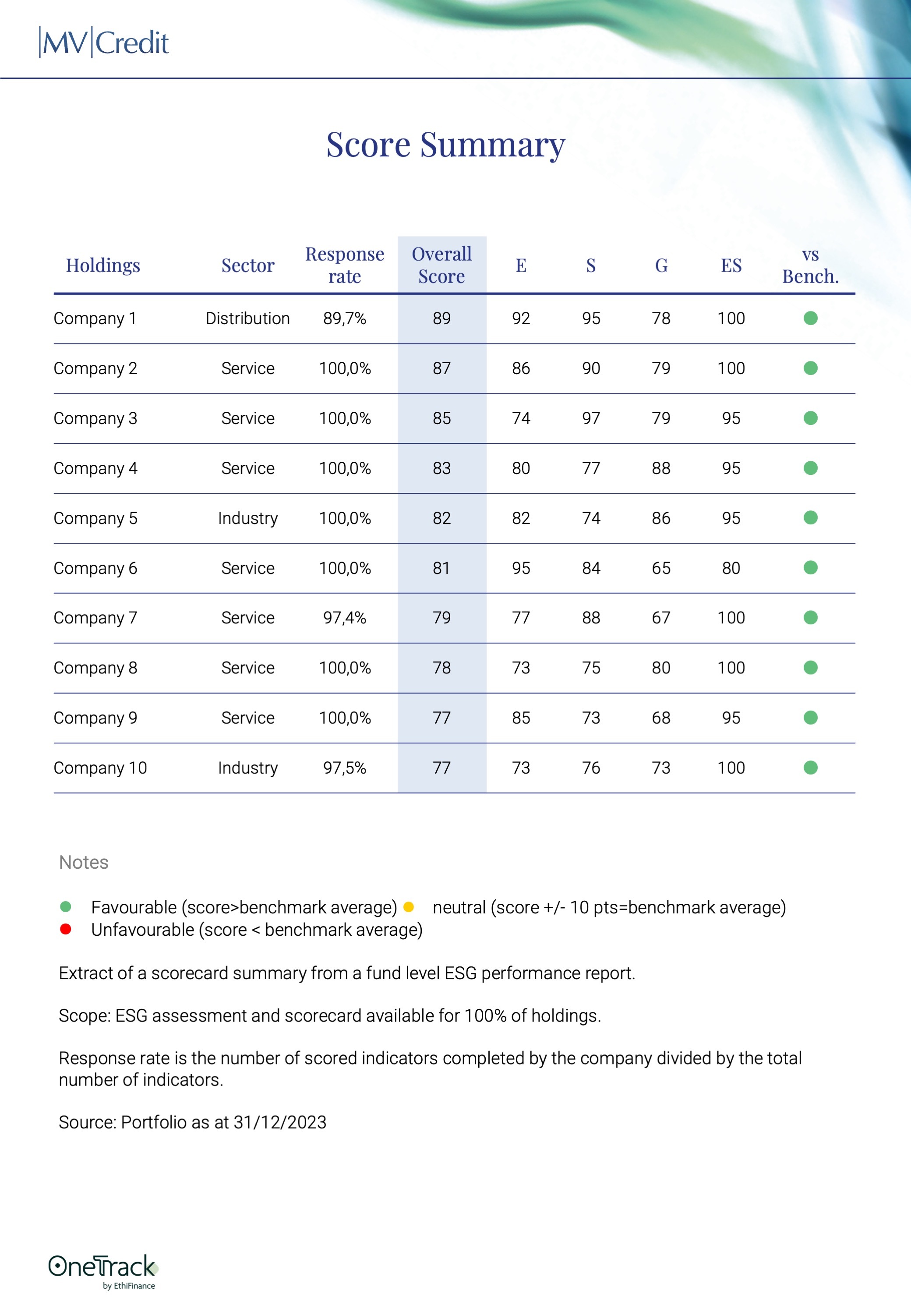Introduction
Integrating ESG into the investment due diligence and deal selection process has become the minimum standard expected of private credit firms from their regulators and investors alike. Indeed, ESG risks are now generally considered investment risks, and their consideration is prudent for any lender concerned with downside protection within their portfolio. MV Credit’s ESG Investment Procedures and Sustainability Policy offer an in-depth overview of how ESG is integrated throughout the investment process1.
When it comes to the role of ESG post-investment, the path is less clear, as the levels of rigour and depth associated with monitoring ESG risks and engaging with borrowers to improve ESG outcomes differ significantly across players in the asset class. As investors’ attention continues to focus on assessing ESG wholistically - in addition to regulators’ emphasis on policies seeking to prevent greenwashing practices2 - engaging portfolio companies on ESG is no longer a ‘nice to have’ element of ESG integration.
This article seeks to explore the role of ESG Engagement for private credit managers as a necessary and desirable component of a comprehensive ESG strategy integrated into the investment process, as well as over the life of ownership.
No Equity, No Influence?
It is well established that private credit managers, as lenders not owners, often have little direct control over the strategic direction of a borrower outside the terms of the loan. Consequently, views on the ability of managers to engage with borrowers on ESG, and indeed the value in doing so, differ across the sector. A cynical view of ESG Engagement may posit that any value created by encouraging borrowers to make ESG related changes to their business would primarily benefit equity owners and their investors rather than lenders who will only marginally benefit from growth or upside.
What is more, from a borrower’s and/or Private Equity Sponsor’s perspective, making business changes to improve ESG performance might require significant investment. If business owners are not convinced of the long-term value proposition of integrating ESG, then Engagement efforts on the part of the lender may act as a competitive disadvantage for managers who require it.
In MV Credit’s view, taking such a simplified approach to ESG Engagement no longer reflects the reality of market dynamics and dismisses both the influence of most private credit managers on their portfolio companies as well as the advantages offered when ESG Engagement is taken seriously.
When it comes to the level of access, direct loans allow greater influence to determine the terms of the deal and engage the borrower on ESG issues. This offers a relative high level of agency which is a key strength of private credit when compared to many public market investment strategies where the public debt or equity of a company is held by many players.
In addition, Private Equity Sponsors who themselves are experiencing a move towards ESG integration and pressure from their investors to demonstrate commitment to the long-term prioritisation of ESG will value an engaged lender as a counterpart that can offer additional resources and knowledge to support portfolio companies. Indeed, ESG Engagement is most effective when conducted in close coordination with a like-minded sponsor. MV Credit’s commitment to working with sponsors who are aligned to our own ESG values significantly facilitates effective cooperation in this regard. Additionally, MV Credit often cooperates with the same Sponsor across loans for multiple portfolio companies. Thus, it is of vital importance to select Sponsors who place similar emphasis and value on ESG integration.
When it comes to the added value of ESG Engagement, two key advantages are apparent. Firstly, regular ESG monitoring should be viewed as on par with credit monitoring as a tool to flag any potential risks leading to the deterioration of credit quality and repayment ability. To track borrowers’ ESG performance post-investment, MV Credit has implemented a comprehensive proprietary ESG questionnaire comprised of c.60 KPIs. Secondly, businesses who are thoughtful about the role of ESG in their strategy and are improving their performance on ESG metrics in the long-term are likely to present an attractive opportunity for future financing.
Getting Sustainability Linked Loans Right
Sustainability Linked Loans (“SLLs”) and the associated margin ratchets are a tool of growing popularity when it comes to ESG Engagement within private credit. While market research demonstrates that less than 10% of private credit managers were offering SLLs to their borrowers in 20213, today, SLLs constitute a significant proportion of the market. For MV Credit, offering SLLs to all potential investment opportunities is a firm part of our Engagement Strategy.
SLLs typically offer margin ratchets incentivising borrowers to achieve specific ESG objectives and KPIs via margin reductions and conversely, hold borrowers to account via margin increases if such objectives are not achieved. Thus, borrowers are rewarded for making ESG-focused changes to the company. In addition, from a lender’s perspective, achieving sustainability targets can make the business more creditworthy and therefore justifies margin decreases. The lower return associated with such products is relatively minor when compared to the potential upside of retaining a reoccurring lending relationship with the borrowers in question and demonstrating the ability to meaningfully affect outcomes.
However, it is vital to stress the importance of appropriately structuring SLLs to ensure their legitimacy and materiality. Indeed, some investors are concerned that SLLs currently coming to market reflect “business as usual” to improve sponsor economics rather than incentivise material improvements.
If insufficiently ambitious, SLLs face the risk of losing credibility amongst investors, as well as attracting regulatory scrutiny given the potential greenwashing risk. For MV Credit, it is therefore crucial to thoughtfully select and oversee the ESG KPIs linked to margin ratchets carefully and ensure that the KPIs selected are (i) relevant to the industry in which the borrower operates, (ii) material to the company itself and (iii) aspirational in nature, taking care not to reward the status quo.
To support the formalisation of SLLs, MV Credit also participates in collaborative efforts to standardise SLLs across the private credit market, led by industry organisations such as the European Leveraged Finance Association and the Alternative Investment Management Association, thereby fostering more transparency in our industry.
ESG Engagement in Practice at MV Credit
MV Credit fully acknowledges the importance of ESG Engagement and has formalised its own approach in its dedicated ESG Engagement policy available here. This policy applies to all direct lending investment funds managed by MV Credit.
Post-investment, MV Credit’s Engagement practices are based on borrowers’ current ESG performance as assessed by our annual ESG questionnaire. MV Credit has worked with a third party to develop a propriety scoring system, whereby each portfolio company is scored on a scale following their response to 60 tracked KPIs in the questionnaire (see Figure 1). This tool has enabled engagement with the Sponsors of the businesses that MV Credit lends to as well as with portfolio companies directly. Specifically, MV Credit aims to focus its engagement on portfolio companies – as well as their respective Sponsors - that show the lowest ESG performances over the life of the investment.
Example of MV Credit ESG Reporting Scorecard

Here it is important to note that many industries have not experienced the same focus on ESG as financial markets. Thus, building the knowledge and capacity required to measure and consistently report ESG data is an investment for private businesses and implementing an appropriate process will take time. In recognising this challenge, MV Credit will offer to have a dedicated discussion to help the borrower identify the main ESG metrics to focus on, based on its activity and improve its capacity to make requested disclosures.
The team will also engage if the low scoring is a result of poor ESG performance, to provide some guidance on how to improve it. In addition, on an ad-hoc basis and upon borrowers’ requirement, MV Credit can provide some dedicated education sessions to provide guidance on how to improve the borrower’s ESG Score.
Notably, MV Credit’s focus on upper mid-market companies which are more developed and sophisticated in nature, facilitates setting up systems focused on ESG, as this market segment is better equipped than, for instance, the SME and lower mid-market segment to improve how ESG is integrated into the business. Moreover, as MV Credit exclusively invests in sponsored transactions, its portfolio companies are also supported by highly experienced Tier 1 Sponsors who are well-positioned to navigate and prioritise ESG integration.
In practice, MV Credit will engage with all borrowers either through quarterly management calls, annual lender calls, ad-hoc Q&As or direct conversations with the relevant Sponsor. MV Credit’s dedicated Sustainability Officer also organises regular meetings with key private equity partners to:
(i) share data collected on both sides, and
(ii) define priority work streams, potentially together with other majority lenders.
MV Credit has found its approach to Engagement to be well received by most of its portfolio companies and Sponsors. In fact, following the most recent ESG assessment of one portfolio company, a Food Products company, MV Credit received a proactive request for further feedback on how the business can improve its ESG score as well as positive feedback on the ESG questionnaire, describing it as ‘comprehensive, relevant and useful’. Following this request, MV Credit’s Sustainability Officer and sustainability service provider thoroughly reviewed the ESG scoring with the portfolio company. MV Credit was able to offer guidance on ‘quick win’ KPIs such as the introduction of intrusion tests for the company’s IT system as well as the implementation of Health, Safety and Security certifications. The portfolio company was also able to present its forthcoming sustainability projects which will address many of its improvement areas and offer better ESG data.
Conclusion
ESG integration does not stop once a loan agreement has been signed. As this paper has shown, a thoughtful and long-term consideration of ESG necessitates its continued prioritisation throughout the life of the loan via a robust approach to ESG Engagement. To learn more about MV Credit’s ESG Engagement policy and ESG integration, please contact us at investor relations or visit our website here.
Footnotes
1 Available upon request
2 For instance: France brings in fines against greenwashing.




